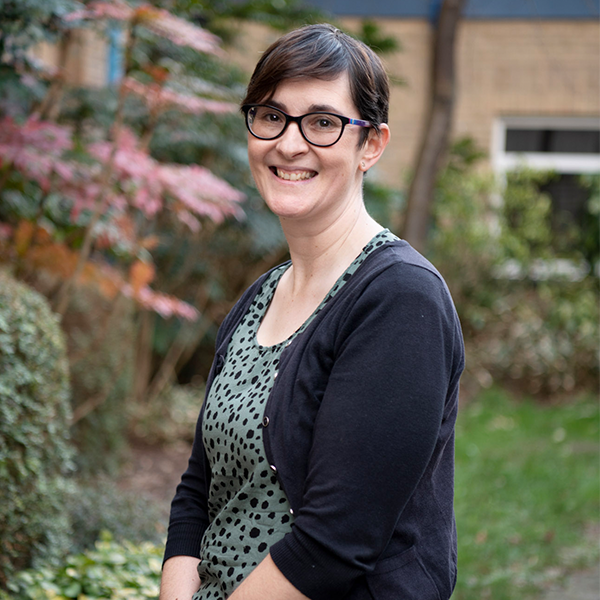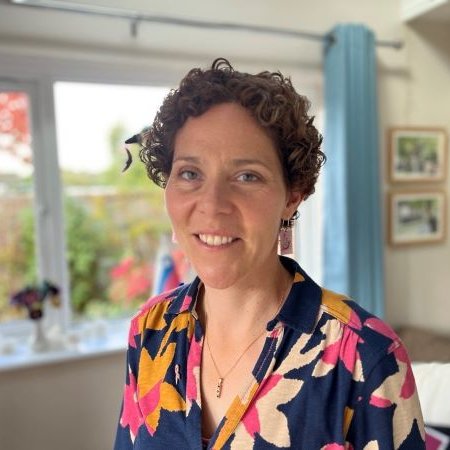Patients who join the Personalised Breast Cancer Programme, which was pioneered at Addenbrooke's Hospital in Cambridge, have their DNA read like a barcode, with the whole genome of their tumour sequenced and the results returned to inform treatment.
Professor Jean Abraham and patient Beccy Sleigh. Watch Beccy's story
Link: https://www.youtube.com/watch?v=NO5_qG23j4o
Funded by Cancer Research UK, the ground-breaking Personalised Breast Cancer Programme (PBCP), that could potentially save thousands of lives, has now opened at the James Paget University Hospital NHS Trust in Great Yarmouth and at Milton Keynes University Hospital NHS Foundation Trust.
This means more people in the East are set to benefit from personalised treatment, as access to the programme is expanded. The James Paget Hospital is the fifth site in the East and the Milton Keynes University Hospital is now the seventh site to be opened nationally following on from the implementation of the programme in Cambridge, Ipswich, Colchester, Norwich, Oxford and Great Yarmouth.
So far, nearly 1,800 patients have been enrolled in the study. Results are returned within six to 12 weeks, enabling patients to have a more precise and personalised cancer treatment.
For many people, results so far have confirmed they were receiving the best treatment available for their disease, whilst over a third have had a change in clinical management.
Professor Jean Abraham, who leads the PBCP from Cambridge University Hospitals NHS Foundation Trust (CUH), explained that for every patient on the programme DNA and RNA readouts from their tumour cells are compared with those of their healthy cells to study which genetic mistakes are causing the disease, and which weaknesses could be targeted with cancer drugs.
Every year, around 5,700 women -as well as a small number of men- are diagnosed with breast cancer in the East of England, whilst around 1,100 women in the region die from the disease.

Professor Abraham, Oncology Consultant at Cambridge University Hospitals NHS Foundation Trust and Professor of Precision Cancer Medicine at the University of Cambridge said: “The benefits are various and depend on the stage of the cancer. If it’s at an advanced stage, the genetic information we get from the whole genome might push us towards a different treatment or you might find a specific mutation that means the patient could take part in a certain clinical trial.
"Some tumours have clustered regions of excessive amounts of mutations. These tumours are said to be hypermutated. Hypermutations are thought to respond better to immunotherapy and so we can push for an immunotherapy trial. Ultimately, these findings can help direct clinicians to using more novel and targeted drugs that have the best chance of helping individual patients.
“A lot of patients won’t see their treatment plan change, but it might offer hope and faster access to the most appropriate treatment if there’s a relapse.
"In addition, establishing an individual doesn’t carry any high-risk hereditary genes is a relief to both the patient and their family.”
The beauty of this sequencing project is we get the data faster and can act on it. "Having the genetic information of the tumour will give us a better idea of what to do should a patient relapse. It becomes an armoury of knowledge, and it could reveal weakness we can target. That can be very reassuring to patients.
Professor Jean Abraham, who leads the Personalised Breast Cancer Programme at CUH
Beccy Sleigh, 43, from near Newmarket, was diagnosed with breast cancer in June 2017. She took part in the PBCP at Addenbrooke’s and her results ensured she received the best possible treatment, helping her get clear of the cancer in six months.
Beccy said: “I found out through the PBCP that my cancer was linked to a faulty BRCA1 gene. The treatment I received focused on certain aspects of my diagnosis that were specific to me – this is massively important."

Knowing where my cancer came from can help members of my family in future, whilst it also means I can make informed decisions about my future. I decided to have my ovaries and tubes removed because of the increased risk and not wanting to go through potential treatment again. Without us taking part in these trials, we wouldn’t have all this knowledge to improve cancer survival rates.
Beccy Sleigh, CUH patient
The pilot phase of the PBCP began in November 2016. It was a collaboration between Cancer Research UK and Addenbrooke’s Charitable Trust, with over 250 patients from the Addenbrooke’s Breast Unit taking part and becoming the first NHS breast cancer patients to have whole genome sequencing of their tumour as part of their routine treatment in a clinically impactful timeframe. A further £1 million of funding from Cancer Research UK, plus more from The Mark Foundation for Cancer Research, was announced in 2018 to enrol a further 2,000 patients.
Professor Abraham and her precision breast cancer research team will move into Cambridge Cancer Research Hospital (CCRH) when the new specialist hospital for the East of England opens on the Cambridge Biomedical Campus. The new hospital will change the story of cancer, breaking down barriers between the laboratory and clinic, and enabling patients to benefit from the latest innovations in cancer science.

Having research and hospital space all under one roof is just brilliant. People can get answers sooner, the clinical trials will happen quicker and ultimately patients like me will be in the best place to receive the best care possible.
Beccy



